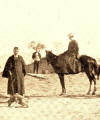
Every age witnesses the birth of some great soul. Sometimes events bring these people to the attention of the world. More often than not, they alter the lives around them, then pass on quietly. Such a soul belonged to the author of this cherished book. There was nothing in Louisa Jebb’s comfortable Victorian youth to indicate she would one day take to the saddle and pen one of the most eloquent equestrian travel books ever written. Yet in the early years of the 20th century, Jebb set out with a female companion to cross the Turkish Empire on horseback. To say they were unprepared to become Long Riders would be an understatement. Neither of them could speak the local language. Furthermore, both wore cumbersome full-length skirts and rode side-saddles. They were, in a word, enthusiastic amateurs who believed courage and common sense would see them through. Remarkably, it did. Having hired a picturesque guide and reliable horses, they set out to explore the secret corners of the Sultan’s empire. What they discovered were guarded harems and regal Pashas, fabled rivers and a desert world of intense beauty. If Jebb rode into Turkey expecting to find adventure, she found it. Yet she discovered something else – nomadic freedom. It is her personal observations about this subject that set By Desert Ways to Baghdad and Damascus apart from other equestrian travel books. “In the untravelled parts of the East you reign supreme, there is no need to go about securely chained to a gold watch. Ignore Time, and he is your servant,” she observed wisely. Sadly, revolution and death soon swept across this fabled land, wiping away the kingdom of the Turkish Caliphs and laying the foundations for the grief which enshrouds this unhappy part of the world today.
